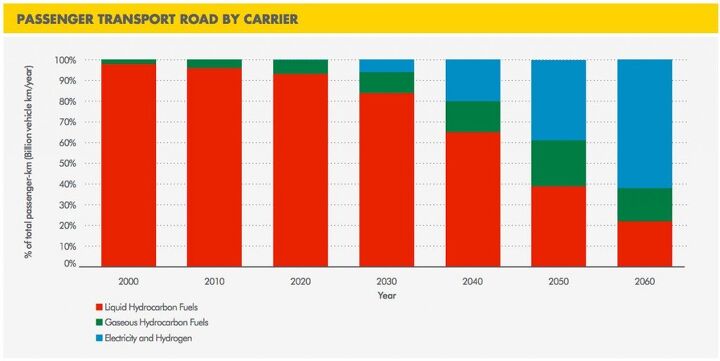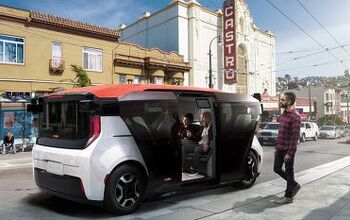Shell Report Sees "Nearly Oil-Free" Transportation by 2070, With Gasoline Replaced by Hydrogen and Electricity
For 40 years the Shell oil company has been putting out reports on what expects in the future. This year’s report titled New Lens Scenarios sees passenger road transportation being “nearly oil-free” by the year 2070. The report is in the plural, scenarios, because the futurists at Shell envision two possible outcomes, which they call “Mountains” and “Oceans”. In both scenarios the world’s population will grow to 9 billion people by 2050 and by 2070 electricity and hydrogen will be the primary means of fueling road transportation.
In the Mountains “lens”, existing governmental and economic power structures are maintained, natural gas will become dominant by the 2030s and demand for liquid fuels will go down. A more urban population will drive much less, about 1,200 miles a year, and use public transport and bicycles more. This lens sees economic growth stagnating and the world failing to meet the target of no more than a 2 degree centigrade rise in average global temperatures.
In the Oceans lens, Shell predicts a changing economic structure to one that is more accommodating of compromise. The world in this more collective scenario would be a more prosperous one, but also more volatile. Dwindling resources of food, energy, and water become the new priorities. Solar and renewable energy becomes more dominant, though fossil fuels will still be used and as with the other scenario, global warming continues.
There’s way too much in the report for a single news blog item, and you’d like, you can read the full PDF file here. A more complete explanation of the nature of the Mountains and Oceans scenarios from the report is below.
Mountains is a world in which those occupying commanding advantage (at the top) generally work to create stability in ways that promote the persistence of the status quo. there is a steady, self-reinforcing, lock-in of incumbent power and institutions. this lock-in constrains the economic potential of some sectors of society, but enables established sectors aligned with market forces to unlock resources that require significant capital and new technology. As for the less fortunate, the thinness of social safety nets is not completely offset by the growth in philanthropy, characterised by an eruption of foundations endowed by increasing numbers of billionaires.
Oceans is a world in which competing interests and the diffusion of influence are met with a rising tide of accommodation. this trajectory is driven by a growing global population with increasing economic empowerment, and a growing recognition by the currently advantaged that their continued success requires compromise. steady reform of economic and financial structures keeps pace with the development of fast-emerging nations and progressively unlocks the productivity of broader sectors in society. But volatility and multiple constituencies impede policy developments in other areas, so tight resources are unlocked primarily by market forces.
More by TTAC Staff
Latest Car Reviews
Read moreLatest Product Reviews
Read moreRecent Comments
- Grg These days, it is not only EVs that could be more affordable. All cars are becoming less affordable.When you look at the complexity of ICE cars vs EVs, you cannot help. but wonder if affordability will flip to EVs?
- Varezhka Maybe the volume was not big enough to really matter anyways, but losing a “passenger car” for a mostly “light truck” line-up should help Subaru with their CAFE numbers too.
- Varezhka For this category my car of choice would be the CX-50. But between the two cars listed I’d select the RAV4 over CR-V. I’ve always preferred NA over small turbos and for hybrids THS’ longer history shows in its refinement.
- AZFelix I would suggest a variation on the 'fcuk, marry, kill' game using 'track, buy, lease' with three similar automotive selections.
- Formula m For the gas versions I like the Honda CRV. Haven’t driven the hybrids yet.


































Comments
Join the conversation
Coming from an oil company, the only real explanation is we will run out of cheap oil by 2070.
Finally managed to get my browser to enable me to read the report. I was reminded that the prime directive in these exercises is never contradict any dearly held opinions of the company CEO. The current Shell management evidently is relatively pessimistic as to the future of hydraulic fracturing. This is revealed in their analysis of that subject which assumes future tight oil output only from the relative handful of known deposits and using more or less current technology. I'm not surprised. The two European majors, Shell and BP are traditionally the most conservative when it comes to estimating the oil and gas resource base.